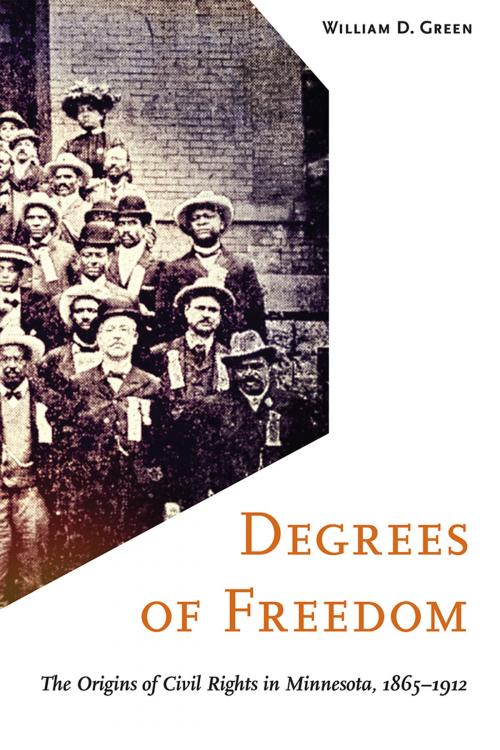Degrees of Freedom
The Origins of Civil Rights in Minnesota, 1865–1912
Nonfiction, Social & Cultural Studies, Social Science, Cultural Studies, African-American Studies, History, Americas, United States, 19th Century| Author: | William D. Green | ISBN: | 9781452944432 |
| Publisher: | University of Minnesota Press | Publication: | May 1, 2015 |
| Imprint: | Univ Of Minnesota Press | Language: | English |
| Author: | William D. Green |
| ISBN: | 9781452944432 |
| Publisher: | University of Minnesota Press |
| Publication: | May 1, 2015 |
| Imprint: | Univ Of Minnesota Press |
| Language: | English |
He had just given a rousing speech to a crammed assembly in St. Paul, but Frederick Douglass, confidant to the Great Emancipator himself and conscience of the Republican Party, was denied a hotel room because he was black. This was Minnesota in 1873, four years after the state had approved black suffrage—a state where “freedom” meant being unshackled from chains but not social restrictions, where “equality” meant access to the ballot but not to a hotel or restaurant downtown.
Spanning the half century after the Civil War, Degrees of Freedom draws a rare picture of black experience in a northern state of this period and of the nature of black discontent and action within a predominantly white, ostensibly progressive society. William D. Green brings to light a full cast of little-known historical characters among the black men and women who moved to Minnesota following the Fifteenth Amendment; worked as farmhands and laborers; built communities (such as Pig’s Eye Landing, later renamed St. Paul), businesses, and a newspaper (the Western Appeal); and embodied the slow but inexorable advancement of race relations in the state over time. Within this absorbing, often surprising, narrative we meet “ordinary” citizens, like former slave and early settler Jim Thompson and black barbers catering to a white clientele, but also outsize figures of national stature, such as Frederick Douglass, Booker T. Washington, and W. E. B. Du Bois, all of whom championed civil rights in Minnesota. And we see how, in a state where racial prejudice and oppression wore a liberal mask, black settlers and entrepreneurs, politicians, and activists maneuvered within a restricted political arena to bring about real and lasting change.
He had just given a rousing speech to a crammed assembly in St. Paul, but Frederick Douglass, confidant to the Great Emancipator himself and conscience of the Republican Party, was denied a hotel room because he was black. This was Minnesota in 1873, four years after the state had approved black suffrage—a state where “freedom” meant being unshackled from chains but not social restrictions, where “equality” meant access to the ballot but not to a hotel or restaurant downtown.
Spanning the half century after the Civil War, Degrees of Freedom draws a rare picture of black experience in a northern state of this period and of the nature of black discontent and action within a predominantly white, ostensibly progressive society. William D. Green brings to light a full cast of little-known historical characters among the black men and women who moved to Minnesota following the Fifteenth Amendment; worked as farmhands and laborers; built communities (such as Pig’s Eye Landing, later renamed St. Paul), businesses, and a newspaper (the Western Appeal); and embodied the slow but inexorable advancement of race relations in the state over time. Within this absorbing, often surprising, narrative we meet “ordinary” citizens, like former slave and early settler Jim Thompson and black barbers catering to a white clientele, but also outsize figures of national stature, such as Frederick Douglass, Booker T. Washington, and W. E. B. Du Bois, all of whom championed civil rights in Minnesota. And we see how, in a state where racial prejudice and oppression wore a liberal mask, black settlers and entrepreneurs, politicians, and activists maneuvered within a restricted political arena to bring about real and lasting change.















